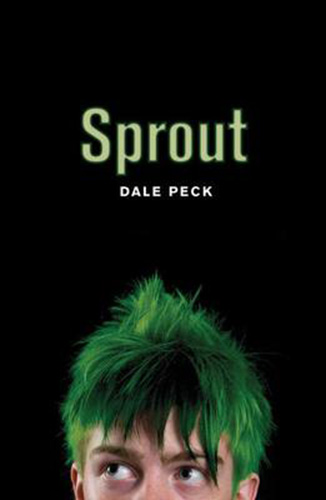Published by Bloomsbury USA Children’s Books, the reading level of Dale Peck’s 2009 novel Sprout is gauged “young adult.” With this intended audience, the “f-word” is only used once, and there is no graphic sexual description—though there is no doubt that Daniel Bradford, who is nicknamed “Sprout” after dyeing his hair green—begins having sex with a male classmate in eighth grade.

Sprout is being groomed by often-pickled English teacher Mrs. Janet Miller to win, show, or place in the state of Kansas essay competition. Sprout’s most prized possession is a dictionary, which he took with him on his first day of school in Buhler, Kansas (8 miles east of Hutchinson, wherein Scott Heim’s Mysterious Skin began). Like the narrator of Allah Is Not Obliged, Sprout looks up words and explains them in the course of his memoir of displacement from Long Island to rural Kansas with his alcoholic father, after Mrs. Bradford died of cancer.
Mr. Bradford buys 11.5 acres north of town, installs a trailer on it and garlands it with vines, in which poison ivy is mixed. And decorates the environs with upturned stumps (that is, dead bases of trees with their roots rising instead of branches). He is close to comatose from alcohol most of the time, and Daniel has to fend for himself in the alien (to him if not to Peck) world of rural Kansas.
Daniel/Sprout has an engaging bratty style. (E.g., “Show me a teenager who doesn’t like to be flattered, and I’ll show you a teenager who’s got a regular source of sex.”) Early on, he endears himself to me by writing an essay (not included in the text) about the superiority of Huckleberry Finn to Catcher in the Rye (he writes it for a teacher whose favorite book Catcher in the Rye is and only get a B+, but Mrs. Miller hears of it, reads it, and focuses her attention on making Sprout the next of her successes in the state essay contest) and by writing, as a coda for the first chapter, “There were a lot of lies in our life, and if I ended up telling a few, it’s only because I’m repeating what I heard.”
Daniel finds sex (with a male classmate) soon in his time at Buhler High School and, later finds love (with another male classmate). He also has a gal pal (fruit fly), towering would-be-model Ruthie Wilcox, who defends him and is the one who dyes his hair on a regular basis.
I raced through the narrative in an afternoon. I enjoyed the style very much and the characters (even though I didn’t fail to notice that especially the alcoholism of the adults verged on stock character(/ization) and the above-ground Wonderland in which Daniel preserved pieces of his Long Island life. Alas, the ending disappointed me — or the endings of different trajectories.

In common with such classic narratives about male adolescents as A Separate Peace and The Kite Runner, the more recent Someday This Pain Will Be Useful to You, and the new Rooftops of Tehran, there is a heavy burden of guilt about a betrayal of someone by the protagonist/narrator. A reviewer cannot reveal the specifics of the betrayal or comment on whether the feelings of guilt are justified, but may empathize—and I do. Teenagers don’t have a monopoly on misunderstanding what they hear and see or on over-reacting, but are especially prone to these, I believe.
I can still recommend Sprout but with a caution that the brilliance of the book is not sustained to the end. Perhaps if someone is expecting a letdown, s/he won’t be let down? Reviewers sometimes suffer (disappointment at the ending in this case) so that their readers don’t, I think.
© 9 June 2009, Stephen O. Murray

